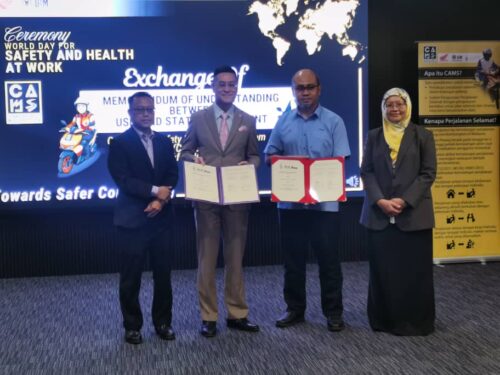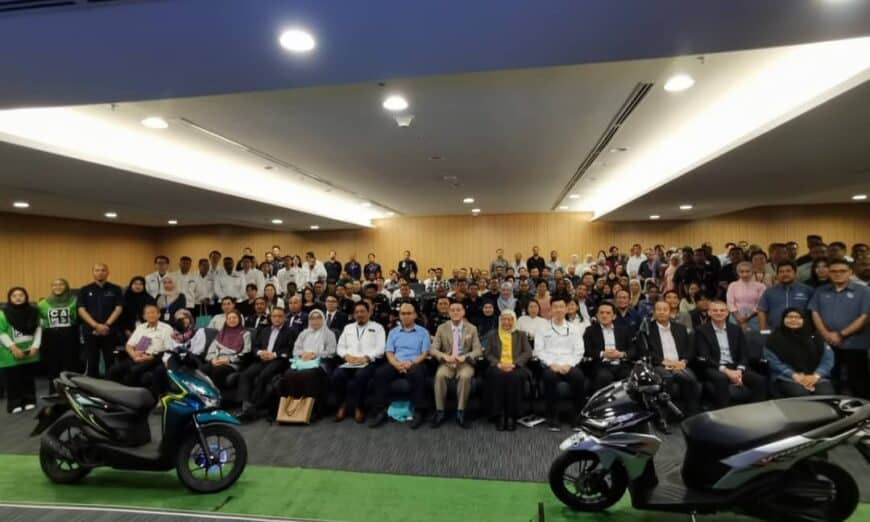IN a concerted effort to enhance road safety awareness, the Penang government has joined hands with Universiti Sains Malaysia (USM) for the Commuting Safety Management System (CAMS) project.
The CAMS initiative is a significant collaborative effort between USM and Boon Siew Honda Sdn Bhd, aimed at reducing motorcycle-related accidents.
With the Penang government’s involvement, this research-driven collaboration is set to foster an exchange of expertise between academia, industry, and government, enriching educational programmes and delivering mutual benefits to all parties involved.
State Infrastructure, Transport and Digital Committee chairman Zairil Khir Johari described the CAMS project as a key strategic initiative aligned with the Penang2030 vision.
“This project embodies the Penang2030 vision by enhancing liveability, improving the quality of life through the reduction of road accidents, and empowering civic participation through community-based safety initiatives,” Zairil said during the opening ceremony of the World Day for Safety and Health at Work held at The Ship Campus in Batu Kawan today.
He added that the project is also in line with the Malaysia Road Safety Plan 2022-2030 and complements the objectives of the Penang Transport Masterplan, which aims to reduce accident rates, particularly among motorcyclists, and elevate the standard of living, liveability, and productivity in the state.
During the event, a Memorandum of Understanding (MoU) was exchanged between USM and the Penang government to formalise their collaboration on the CAMS project.

Among those present were Bukit Tambun assemblyman Goh Choon Aik, USM deputy vice-chancellor Prof Dr Azlan Amran, USM CAMS project leader Assoc Prof Dr Lilis Surienty Abd Talib, and Boon Siew Honda Human Resources and Administration chief officer Rosidan Harun.
Zairil also highlighted the alarming road fatality statistics in Penang.
“Currently, 80% of road deaths in Penang involve motorcyclists.
“Statistics from the Social Security Organisation (Socso) reveal that commuting accidents among employees have doubled over the past two decades, with 38,458 cases reported in 2023—an increase of 54% compared to 17,609 cases in 2003,” he said.
According to Zairil, findings from the CAMS study are consistent with Socso’s data, showing that 59% of accidents occur while commuting to work, while 41% occur on the way home.
“Similarly, Socso’s data shows 52.1% of accidents happen en route to work, with about 36% occurring on the return journey.
He further shared the positive outcomes from the CAMS pilot project implemented at the Batu Kawan Industrial Park (BKIP).
“Focused interventions over five years have resulted in zero accidents over a 10-month period among new employees trained in safety riding—whereas previously, accidents would typically occur within two to four weeks of starting work,” he said.
Zairil also noted a significant reduction in hand injuries following the introduction of gloves for riders who completed intermediate-level safety riding training under the CAMS programme.
He credited the success of the initiative to the strong synergy among the three key players: the university, the state government, and industry.
“USM led the project through comprehensive data analysis, monitoring, and intervention work. The state government facilitated engagement with agencies and industries, while participating companies directly implemented interventions and closely monitored their motorcyclists,” Zairil explained.
He concluded by emphasising the collective responsibility required to ensure safer roads.
“Road safety is everyone’s responsibility. Only through shared commitment and active participation can we create a safer commuting environment for all,” he said.
Story by Riadz Akmal
Pix by Eng Kok Wei

